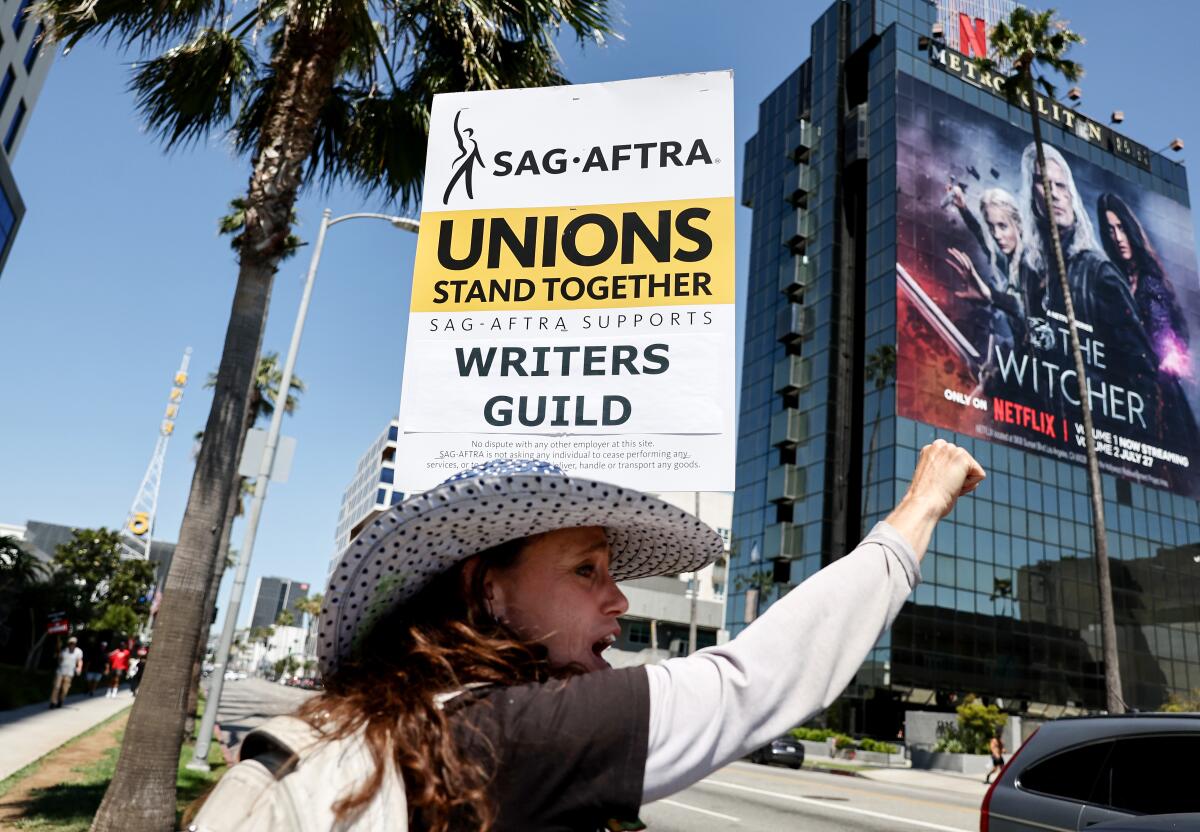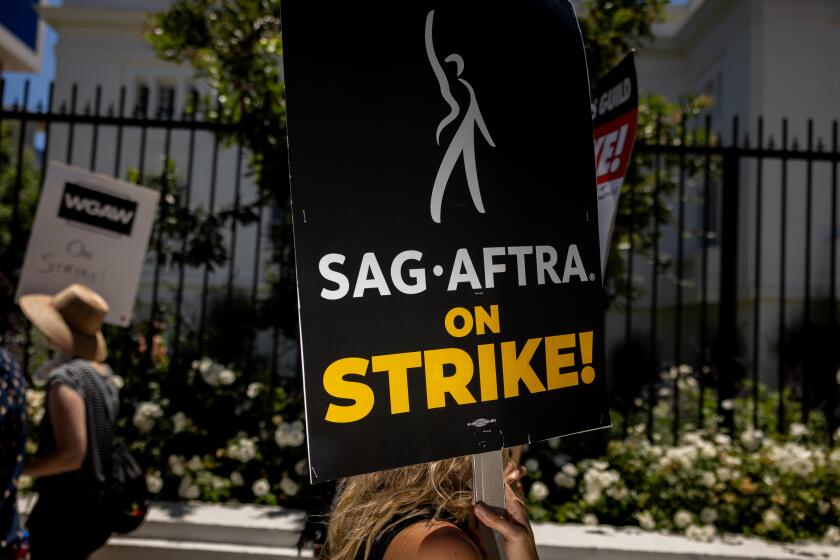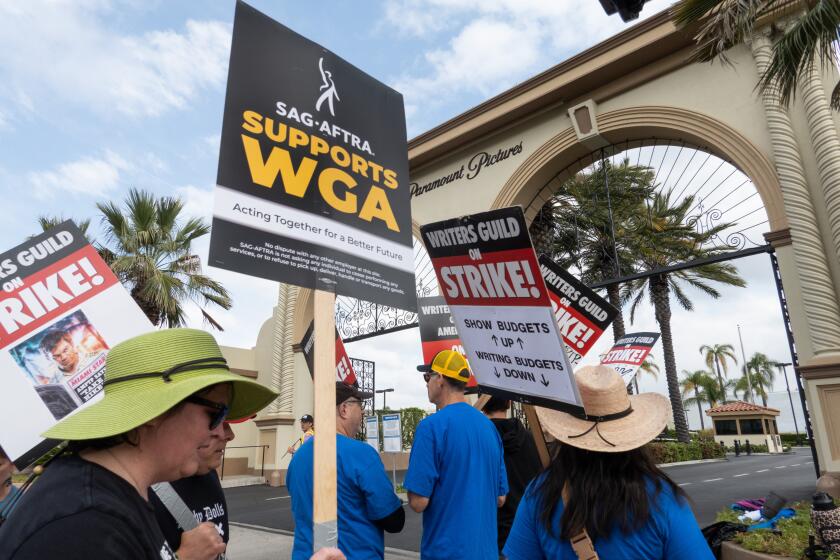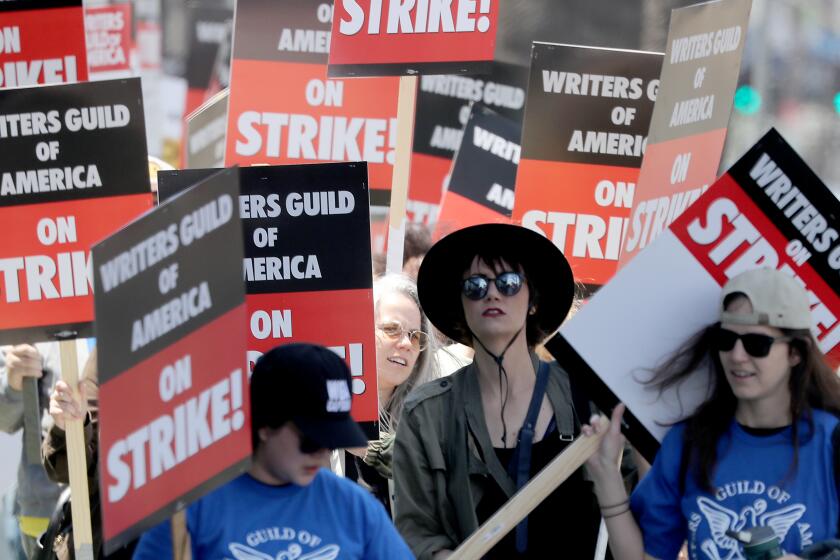Hollywood actors poised to strike after SAG-AFTRA contract expires with no deal

- Share via
The union representing Hollywood actors is poised to strike and join writers on picket lines in back-to-back walkouts for the first time since 1960, widening the labor conflict that has roiled the film and TV industry.
Despite the involvement of a federal mediator who was brought in at the eleventh hour to help resolve the conflict, groups representing the actors and the studios were unable to agree to a new film and TV contract before a Wednesday night deadline.
By an overwhelming 98%, the union’s members previously authorized their leaders to call a strike if they could not secure a new contract to replace one that was originally set to expire June 30.
SAG-AFTRA leaders said early Thursday that the guild’s negotiating committee had voted unanimously to recommend to the union’s national board of directors that they formally approve a strike action, which could begin as early as Friday with pickets likely to take place in Los Angeles, New York and other cities.
“SAG-AFTRA negotiated in good faith and was eager to reach a deal that sufficiently addressed performer needs, but the AMPTP’s responses to the union’s most important proposals have been insulting and disrespectful of our massive contributions to this industry,” said SAG-AFTRA President Fran Drescher in a statement. “The companies have refused to meaningfully engage on some topics and on others completely stonewalled us.”
SAG-AFTRA’s national board will vote Thursday morning on whether to strike. The union said it plans to hold a news conference at noon in Los Angeles after the vote.
Tensions escalated on Tuesday when SAG-AFTRA blasted the Alliance of Motion Picture and Television Producers, which represents the studios in labor negotiations, over a last-minute proposal to bring in a federal mediator to help resolve the labor conflict.
The AMPTP made the request for assistance from a federal mediator after several top Hollywood executives, including Warner Bros. Discovery boss David Zaslav, held calls to discuss the labor standoff.
Leaders of the 160,000-member union called the move a “cynical ploy,” saying they had not been notified of the mediator proposal before news of it was leaked to a trade publication.
And there was little expectation that the mediator from the Federal Mediation and Conciliation Service — who only joined negotiations on Wednesday — would have enough time to settle the conflict before the midnight deadline.
The studio alliance, in a statement, put the blame on SAG-AFTRA by saying the union rejected its offer of “historic” increases and pay and residuals, among other things including a proposal to protect actors’ likenesses amid the rise of AI.
“We are deeply disappointed that SAG-AFTRA has decided to walk away from negotiations,” the AMPTP said. “This is the Union’s choice, not ours... Rather than continuing to negotiate, SAG-AFTRA has put us on a course that will deepen the financial hardship for thousands who depend on the industry for their livelihoods.”
SAG-AFTRA has approved a deal from the studios to end its historic strike. The actors were on strike for more than 100 days.
An actors’ strike would create a new crisis for Hollywood, which has been upended by a writers’ strike that began May 2. A walkout by actors in addition to writers will halt any remaining scripted production activity and will likely have widespread effects on planned movies and TV shows.
At stake is the fall TV season of new shows and existing series that have in many cases already been delayed by the writers’ strike.
Further production shutdowns and uncertainty also will deal a blow to Southern California’s economy, with thousands of crew members in the region and small businesses that depend on the region’s cornerstone entertainment economy.
Negotiations between SAG-AFTRA and the AMPTP began on June 7. Talks were extended until July 12 to allow more time for bargaining after guild leaders said they were making good headway.
However, the sides remained far apart on key issues, said sources familiar with the negotiations who were not authorized to comment.
Like writers, actors say they’ve been shortchanged by the streaming revolution and are seeking to boost the residual payments they get when shows are distributed on Netflix and other platforms.
Members of SAG-AFTRA voted by a wide margin to give their leaders authority to call a strike even before negotiations have begun with the major studios.
One especially contentious issue: SAG-AFTRA is demanding a significant boost in residual payments from streaming platforms to reflect the success of shows and how those payments are calculated. In particular, studios have balked at a demand that a third-party firm would be used to estimate viewership and have argued that many of the platforms are not yet profitable.
Additionally, actors have demanded higher wages to counter the rise of inflation, boosts to the union’s health and pension plan, and safeguards around the use of AI, which has emerged as a major issue of concern for performers.
The 2023 writers’ strike is over after the Writers Guild of America and the Alliance of Motion Picture and Television Producers reached a deal.
SAG-AFTRA also has highlighted concerns about the growing use of self-tape auditions that are time-consuming and costly for actors.
“The studios and streamers have implemented massive unilateral changes in our industry’s business model, while at the same time insisting on keeping our contracts frozen in amber,” National Executive Director and chief negotiator Duncan Crabtree-Ireland said in a statement. “The studios and streamers have underestimated our members’ resolve, as they are about to fully discover.”
The last time actors went on strike over their film and TV contract was in 1980. That dispute, which lasted more than three months, was sparked by the union’s demands to secure a larger cut of profits from the emerging home video market.
Two decades later, SAG members went on strike for six months over a fee system for commercials.
This is the first strike for SAG-AFTRA, which formed in 2012 in the contentious merger of the Screen Actors Guild and its sister union, the American Federation of Television and Radio Artists.
Inside the business of entertainment
The Wide Shot brings you news, analysis and insights on everything from streaming wars to production — and what it all means for the future.
You may occasionally receive promotional content from the Los Angeles Times.
The AMPTP has yet to resume talks with writers. The alliance negotiated an agreement with the Directors Guild of America in June that secured increases in pay, a new residual based on international subscriptions to streaming platforms and restrictions on the use of AI.
But representatives of the WGA and SAG-AFTRA said the contract did not go far enough to resolve their issues and that they would not be bound by another union’s terms.
More to Read
Inside the business of entertainment
The Wide Shot brings you news, analysis and insights on everything from streaming wars to production — and what it all means for the future.
You may occasionally receive promotional content from the Los Angeles Times.














